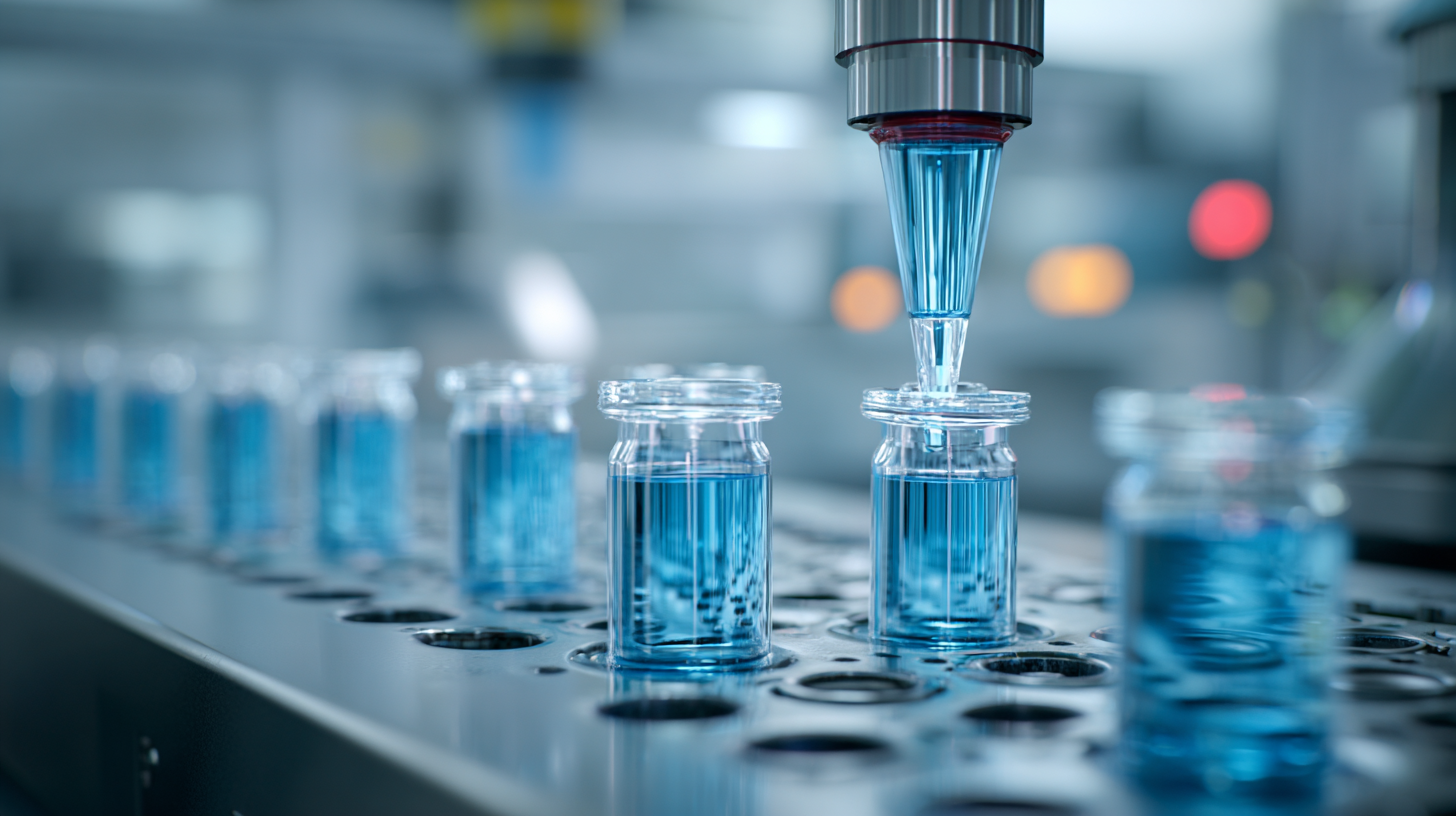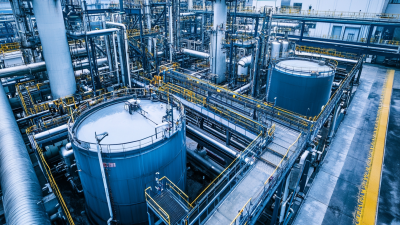
Unlocking the Future of Peptide Api Manufacturing in Biotechnology Innovations
In recent years, the field of biotechnology has seen a remarkable surge in the demand for innovative methods in Peptide API Manufacturing, a crucial aspect of drug development and therapeutic interventions. According to a report by Grand View Research, the global peptide therapeutics market is anticipated to reach a staggering USD 54.79 billion by 2027, demonstrating a compound annual growth rate (CAGR) of 9.0%. This burgeoning market emphasizes the critical need for advanced manufacturing processes to meet the increasing demand for high-quality peptide-based drugs. Key players in the industry are now focusing on unlocking the future of Peptide API Manufacturing through the adoption of cutting-edge technologies, such as automation and process optimization, which promise to enhance efficiency and scalability. These innovations not only aim to streamline production but also to ensure compliance with stringent regulatory standards, paving the way for a new era of breakthroughs in peptide therapeutics that could significantly impact patient outcomes worldwide.

Emerging Trends in Peptide API Manufacturing: A Statistical Overview
The landscape of peptide Active Pharmaceutical Ingredient (API) manufacturing is evolving rapidly, driven by advancements in biotechnology and an increasing demand for precision medicine. According to a recent report by MarketsandMarkets, the global peptide therapeutics market was valued at approximately $25 billion in 2022, with projections to reach around $43 billion by 2027, growing at a compound annual growth rate (CAGR) of 11.5%. This growth underscores the significance of peptides in therapeutic development, highlighting the need for innovative manufacturing processes that can keep pace with this increasing demand.

Emerging trends in peptide API manufacturing reflect a shift towards more efficient and scalable production methods. For instance, the adoption of continuous manufacturing techniques has been shown to enhance yield and reduce costs significantly. A study by Deloitte indicates that companies implementing these technologies have seen a reduction in production time by up to 30%. Moreover, advancements in purification and synthesis technologies, including the use of automated platforms, are streamlining operations and improving the quality of the final product. Such innovations not only enhance production efficiency but also ensure that peptide therapeutics can be delivered more reliably to meet the needs of patients worldwide.
Innovative Technologies Reshaping Peptide Production Efficiency
Innovative technologies are significantly reshaping peptide production efficiency in the biotechnology sector. One of the key advancements is the adoption of continuous flow processes, which can enhance yield and quality compared to traditional batch methods. According to a report by MarketsandMarkets, the global peptide therapeutics market is projected to reach $52.4 billion by 2027, with continuous manufacturing playing a crucial role in this growth. This method minimizes waste, reduces production time, and improves scalability, making it a game-changer for peptide manufacturing.
Another revolutionary technology is the increasing use of automation and artificial intelligence in peptide synthesis. By integrating machine learning algorithms with automated processes, manufacturers can optimize reaction conditions and predict outcomes with greater accuracy. A study published in Nature Biotechnology suggests that AI-driven approaches could reduce peptide synthesis time by up to 30%, allowing for rapid development of new therapeutic candidates. Such advancements not only improve efficiency but also lower operational costs.
**Tips:** When considering peptide production technologies, always evaluate the scalability of the process and the potential for integration with existing manufacturing systems. Furthermore, stay updated on regulatory guidelines and market trends to ensure compliance and competitiveness in this fast-evolving landscape.

Cost-Effectiveness in Peptide API Development: An Analytical Approach
The peptide active pharmaceutical ingredient (API) market is poised for remarkable growth, driven by the increasing demand for innovative therapeutics and advancements in biotechnology. With an expected CAGR of 4.95%, the market size is projected to expand from USD 59.09 billion in 2024 to USD 91.27 billion by 2033. This growth reflects a rising interest in peptide-based drugs, which are considered critical in treating various diseases due to their specificity and efficacy.
Cost-effectiveness is a central theme in the development of peptide APIs. As companies navigate rising production costs and complex regulatory landscapes, they seek analytical approaches that optimize synthesis processes and reduce waste. The peptide synthesis market itself is anticipated to grow significantly, from USD 2.8 billion to USD 5.1 billion by 2035, at a CAGR of 5.5% over the next decade. With over 75 firms actively contributing to this sector, innovations in manufacturing techniques and scaling processes are critical to achieving the desired cost efficiencies, thus unlocking the future potential of peptide API development.
Quality Control Innovations in Biotech: Ensuring Peptide Integrity
The realm of biotechnology is witnessing revolutionary advancements in peptide manufacturing, particularly in the area of quality control. As the demand for research-grade peptides surges, companies are innovating to ensure that the peptides maintain their integrity throughout the manufacturing process. Recent investments exceeding €1 billion in peptide manufacturing highlight the commitment within the industry to enhance development capabilities. This strategic funding aligns with the growing trend of advanced peptide synthesis, which is essential for unlocking new therapeutic avenues and precision medicine.
Quality control innovations are paramount in ensuring the efficacy and safety of peptides used in research and therapeutics. Sophisticated analytics and protocols are now being implemented to monitor the synthesis process, guaranteeing that the final products meet the rigorous standards expected by researchers. Industry reports estimate that 70% of researchers consider the integrity of peptides a critical factor in their experimental outcomes.
**Tip:** When selecting peptide providers, always inquire about their quality assurance processes and the certifications they possess.
Furthermore, rigorous quality control not only enhances peptide reliability but also promotes reproducibility in scientific experiments. Advanced techniques in peptide synthesis are poised to revolutionize the biotech landscape, driving forward biomedical innovations that depend on the precise application of these essential molecules.
**Tip:** Look for providers who offer transparency in their manufacturing practices and are committed to continuous quality improvements.
Future Market Projections for Peptide APIs: Opportunities and Challenges
The peptide API market is poised for significant growth, with projections indicating a compound annual growth rate (CAGR) of 4.95%. By 2024, the market size is estimated to reach USD 59.09 billion, escalating to USD 91.27 billion by 2033. This growth trajectory underscores the increasing importance of peptide-based therapeutics, driven by advancements in biotechnology and pharmaceutical innovations.
The peptide contract development and manufacturing organization (CDMO) segment is expected to witness even more rapid expansion, with a staggering CAGR of 15.0% anticipated by 2031. This surge is reflective of rising demand for customized peptide solutions and the increasing complexity of peptide manufacturing processes. Key players in the industry are likely to capitalize on these trends, fostering collaborations and investments to enhance production capabilities and address both opportunities and challenges within this dynamic market landscape.
Future Market Projections for Peptide APIs
Related Posts
-

Maximizing ROI: The After-Sales Service Edge in Best Peptide API Manufacturing
-

China's Resilient Growth in Peptide API Manufacturing Amidst US China Trade Tariff Challenges
-

Ultimate Guide to Sourcing the Best Peptide Api Manufacturing for Your Business Needs
-

How to Effectively Scale Peptide API Manufacturing for Optimal Yield and Purity
-

5 Reasons Why Best Peptide Materials Are Essential for Your Global Sourcing Strategy
-

Understanding Peptide Materials A Comprehensive Guide for Global Buyers
